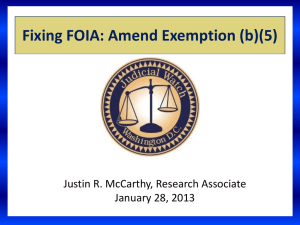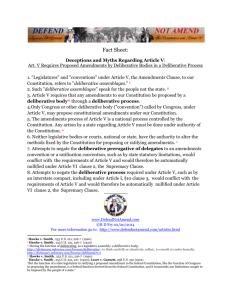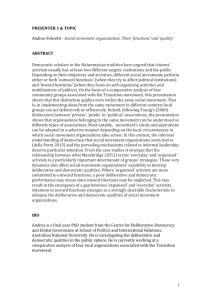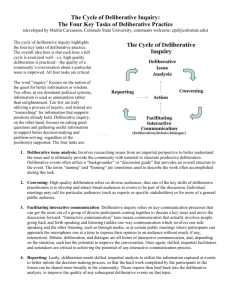Deliberative systems presentations
advertisement
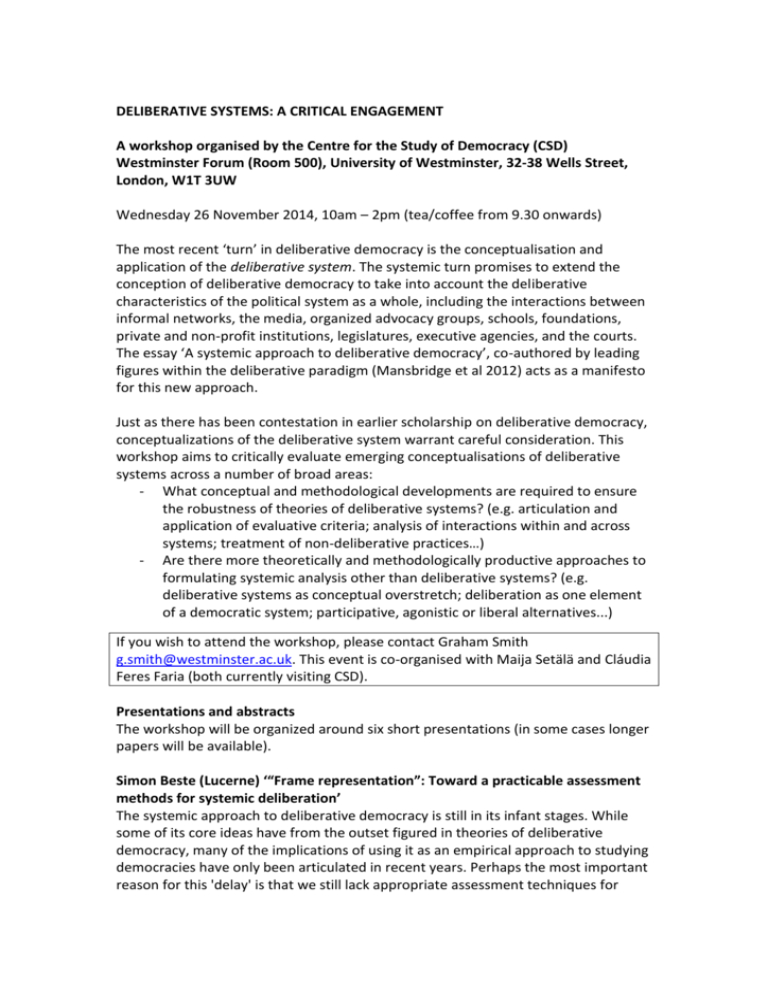
DELIBERATIVE SYSTEMS: A CRITICAL ENGAGEMENT A workshop organised by the Centre for the Study of Democracy (CSD) Westminster Forum (Room 500), University of Westminster, 32-38 Wells Street, London, W1T 3UW Wednesday 26 November 2014, 10am – 2pm (tea/coffee from 9.30 onwards) The most recent ‘turn’ in deliberative democracy is the conceptualisation and application of the deliberative system. The systemic turn promises to extend the conception of deliberative democracy to take into account the deliberative characteristics of the political system as a whole, including the interactions between informal networks, the media, organized advocacy groups, schools, foundations, private and non-profit institutions, legislatures, executive agencies, and the courts. The essay ‘A systemic approach to deliberative democracy’, co-authored by leading figures within the deliberative paradigm (Mansbridge et al 2012) acts as a manifesto for this new approach. Just as there has been contestation in earlier scholarship on deliberative democracy, conceptualizations of the deliberative system warrant careful consideration. This workshop aims to critically evaluate emerging conceptualisations of deliberative systems across a number of broad areas: - What conceptual and methodological developments are required to ensure the robustness of theories of deliberative systems? (e.g. articulation and application of evaluative criteria; analysis of interactions within and across systems; treatment of non-deliberative practices…) - Are there more theoretically and methodologically productive approaches to formulating systemic analysis other than deliberative systems? (e.g. deliberative systems as conceptual overstretch; deliberation as one element of a democratic system; participative, agonistic or liberal alternatives...) If you wish to attend the workshop, please contact Graham Smith g.smith@westminster.ac.uk. This event is co-organised with Maija Setälä and Cláudia Feres Faria (both currently visiting CSD). Presentations and abstracts The workshop will be organized around six short presentations (in some cases longer papers will be available). Simon Beste (Lucerne) ‘“Frame representation”: Toward a practicable assessment methods for systemic deliberation’ The systemic approach to deliberative democracy is still in its infant stages. While some of its core ideas have from the outset figured in theories of deliberative democracy, many of the implications of using it as an empirical approach to studying democracies have only been articulated in recent years. Perhaps the most important reason for this 'delay' is that we still lack appropriate assessment techniques for large-scaled deliberative processes. In this paper, I suggest to abandon classic microdeliberative indicators (e.g. respect), arguing that these indicators are incompatible with the holistic idea underlying the systemic approach. Instead, I propose to analyze discourse content and the representation of policy frames. Specifically I suggest that systemic approaches to deliberative democracy should focus on the relationship between the perceptions and presentations of policies in the mass media and in parliamentary debates. This relationship best proxies the interaction between civil society and the legislature, thus allowing us to monitor how well parliaments can capture the frames present at the civil society level. Such 'frame representation' within the legislature is a crucial indicator for the level of sub-systemic deliberative uptake and policy responsiveness. The suggested methodology offers a novel pathway for comparative empirical analyses of deliberative systems. Marit Boeker (Essex) 'The (Missing) Cultural Dimension of Deliberative Systems' Although the concept of ‘deliberative systems’ has emerged in response to the limitations of institutional experiments such as mini-publics in realising deliberative democracy in practice, there is one limitation it has so far retained: the lack of a cultural dimension. In this paper, I argue that deliberative democracy at least partly manifests itself in a society’s political culture. Defined as all of the informal, unsteered norms, expectations, meanings and customs that drive citizens’ attitudes and behaviour in the political arena, political culture realises the bottom-up, emancipatory dimension of deliberative democracy that is central to its conception of democratic legitimacy yet beyond the reach of purposive institutional engineering. By going beyond small-scale institutional experiments, the systemic turn in deliberative democratic theory opens up the conceptual space for a consideration of the role of culture; yet, its conceptualisations have so far largely continued to focus on (semi-)formal institutions and actors. To remedy this, I outline the role of political culture in deliberative systems, and draw out its implications for realising deliberative democracy in practice. John Boswell (Southampton) ‘Scaling along deliberation’ Deliberative democracy is undergoing a 'systemic turn'. Acknowledging that their micro focus on ideal deliberation was too restrictive, deliberative democrats are seeking to 'scale up' deliberation to broader political systems. This systemic view is appealing, but some moves made along the way appear problematic. This paper focuses on three such moves—relaxing consensus as an ideal, and distributing deliberative functions across sites, and over time. It shows how collectively these moves generate 'wriggle room' that, in the inescapably attritional and opaque process of policymaking, powerful interests can exploit. Rather than railing against these changes to the ideal of deliberative democracy, it advocates further adapting ideas about the deliberative system so as to better confront and redress these power asymmetries, in particular arguing for more attentiveness towards ways of effectively 'scaling along' deliberation, too. Paul Gunn (Goldsmiths) ‘The political epistemology of deliberative democracy: Challenges and opportunities for deliberation in practice’ The so-called 'systemic turn' in deliberative democracy has seen theorists identify and confront various problems faced by theories of deliberative democracy. The challenge of epistemology, however, has been curiously neglected. The basis of this challenge is the recognition of the importance of political beliefs for political action: people make political decisions on the basis of beliefs concerning the effects of those decisions. To understand the prospects of systematic deliberation, then, it is necessary to understand the sources and content of participants' beliefs. How do participants spread across political systems interpret either their own interests or the public interest? From what sources are these interpretations predominantly drawn? And how accurate are they? In this paper, I propose a framework for considering these questions. I contend that the myriad sources of political beliefs in modern polities is both a challenge and an opportunity for deliberative democracy. For, on the one hand, it multiplies the principal problem for deliberating democrats, that of identifying accurate beliefs. But on the other, it offers participants an opportunity to test dominant beliefs. I end the paper by suggesting that how deliberative systems support belief construction, and crucially whether or not individuals are given the opportunity to act upon and maintain minority beliefs therefore determines how robust the deliberative decision-process will tend to be. David Owen (Southampton) and Graham Smith* (Westminster) ‘Deliberation, Democracy and the Systemic Turn’ (*presenter) Unable to attend due to illness The conceptualization of the ‘deliberative system’ has emerged as the most recent manifestation of scholarship on deliberative democracy. This paper offers a critique of the dominant approaches to theorizing the deliberative system, with particular attention to the way in which non-deliberative practices are addressed. Our contention is that in its current form the systemic turn fails to recognize central normative features of deliberative democracy as a political ideal. The paper sketches two alternative approaches to systemic considerations. The first lays out on an account of the deliberative system focused on the cultivation of a ‘deliberative stance’ among citizens in their formal and informal civic interactions and empowerment of deliberation through its integration into decision-making arenas. The second problematizes the ‘deliberative’ framing of the systemic turn and directs attention to the role of deliberation, as one element among others, within democratic systems William Smith (The Chinese University of Hong Kong) ‘On the Boundaries of a Deliberative System: The Case of Disruptive Protest’ The idea of a deliberative system has been introduced by a number of scholars to defend the claim that deliberative democracy is not limited to microcosmic forums, but is also an ideal that must be realised at the macro level. The argument of this paper is that an important ambiguity in the concept of a deliberative system must be resolved before it can be utilized in normative, conceptual or empirical analysis. The problem is that the boundaries of a deliberative system must be drawn with greater precision than has hitherto been the case, in order that a clear determination can be made about what is internal to the system and what is external to the system. The attempts to address this problem through reference to either decision-making or systemic functionality are both found to be wanting in important respects. This paper thus proposes an alternative approach, which defines the boundaries of a deliberative system through reference to a conception of deliberative action. The idea is that a deliberative system should only be thought to contain elements that embody substantive norms of deliberative action to an adequate degree, with all elements that do not embody these norms treated as external variables. The implications of this approach are illustrated through considering the relationship between different types of disruptive protest and deliberative systems.


